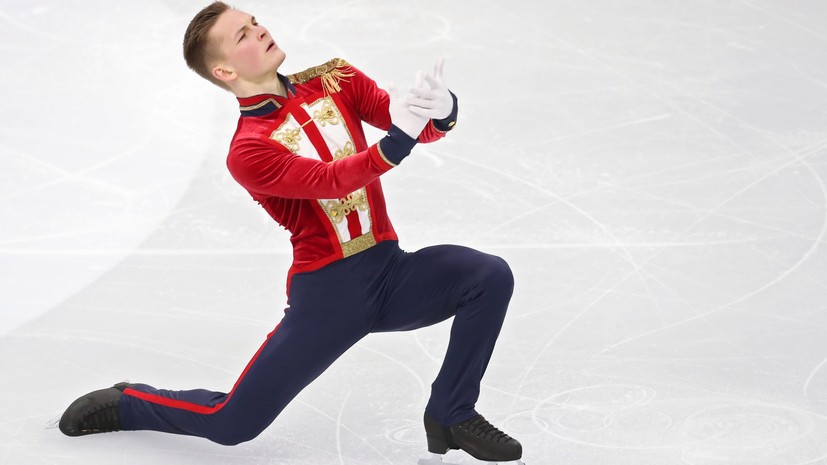The old figure skating truth at all times said that you cannot win a competition with a short program, while you can easily lose.
This statement was especially relevant in the days of the old refereeing system, when the placement of athletes in the protocol was determined by the so-called sum of places and, having flown out of the top three after the first skate, it was extremely difficult for skaters to get into the number of medalists purely mathematically.
The new system seems to have pushed the evaluative anachronism into the past, but the significance of the short release is actually not greatly diminished.
It is still the very dress that the skater is greeted, remembered, and sometimes even guided by throughout the season.
How they led Alina Zagitova in 2018.
You can, of course, disagree, but yesterday's junior, most likely, predetermined her Olympic victory in Pyeongchang with a short program at the 2018 European Championships in Moscow. It was there, a month before the Games, that for the first time she outstripped Evgenia Medvedev in full-time wrestling, thereby showing the whole world of figure skating that she could remove the queen from the throne. Without that victory, it is unlikely that the judges would have decided on such generous points in South Korea.
That is why Mikhail Kolyada was obliged to skate his short program in Turin without blunders. The context, of course, asks for the word "impeccable", but the skater entered the current season too hard to demand perfect performance from him. Although the second half of autumn is already a time to demonstrate oneself fully armed, as was done in the same Turin, first the dancers Gabriela Papadakis and Guillaume Sizeron, and then the greenhouses Sui Wenjing and Han Tsun, leaving the rivals room for reflection on the fate of future Olympic medals. Maximum - silver. At least, this is how it is seen now.
On a global scale, Kolyada, of course, is not a favorite, but you don't need to be a keen connoisseur of figure skating to understand, or, if you like, to feel that the halo of the country's most promising single skater continues to hang over Mikhail.
A person who is about to find his best condition in his legs, confidence in his gaze and will stop giving out "butterflies".
On which you can bet in the Olympic team tournament and not lose it.
It was for this that two years ago the leaders of Russian figure skating jointly sent Kolyada to Alexei Mishin, and already last season there was a feeling that the skater and coach managed to find a certain algorithm of actions that could turn into the desired result - Mikhail became the fifth at the World Championships in Stockholm and set a personal best in a free program, performing at the team championship in Japan.
This autumn has begun rather vaguely for the St. Petersburg resident: the first important start was the Finlandia Trophy tournament, where he finished second, ahead of the 2020 European champion Dmitry Aliev, but lost 5.54 points to Jason Brown.
At the same time, Kolyada skated the short program with the third result, breaking the cascade, and in the free program he suddenly lost to the Italian Matteo Rizzo.
So it turns out that at the starting stage of the Grand Prix series, the status ward Mishin found himself in the position of Baron Munchausen, who had to pull himself out of the swamp by the hair.
But for this it was necessary at least not to disrupt a single jump element in the short program.
Alas, it didn't work out.
The perfect cascade with a quadruple salchow was followed by a fall from the second quadruple jump.
In comparison with his "Finnish" result, Kolyada scored almost ten points more (92.30), but, as the Olympic champion of Salt Lake City Alexey Yagudin, commenting on the singles tournament, has correctly noted, Mikhail has absolutely everything to gain in the short the program is an order of magnitude larger, and to do this, as they say, in an operating mode.
But this is exactly what does not happen to the skater.
And it's not just about jumping.
In the end, everyone can make a mistake on a quadruple, but if you are really such an outstanding rider, as others have been saying for many years now, why the hell are you getting the third level of difficulty for the step sequence?
Why are you squandering points where you have to pick them up?
Of the three Russian participants, Kolyada remained the best in the short program: Pyotr Gumennik and Dmitry Aliev took ninth and tenth places, respectively, two dozen points behind the top three.
The author of the main sensation of the evening was not Jin Boyang, who unmistakably skated the short program (which is completely uncharacteristic for him) and performed two flawless quads.
Nor is Brian Orser's Korean student, Jung Hwang Cha.
And the Italian Daniel Grassl, who did not even wedge in between them, exceeded the personal record by ten points under the famous, thanks to last year's Kolyada, "White Crow".
The vice-champion of the world, Yuma Kagiyama, surprised with a minus sign.
The Japanese completely collapsed both quadruple jumps, which lifted him six months ago to a pedestal in Stockholm, in connection with which he was also left without a cascade.
As a result, only seventh place and the loss of a place in the strongest warm-up before the free program.
But Kolyada moved there, who still has a chance to prove to his fans and his coach that all the efforts made to return to the elite of men's single skating were not in vain.

